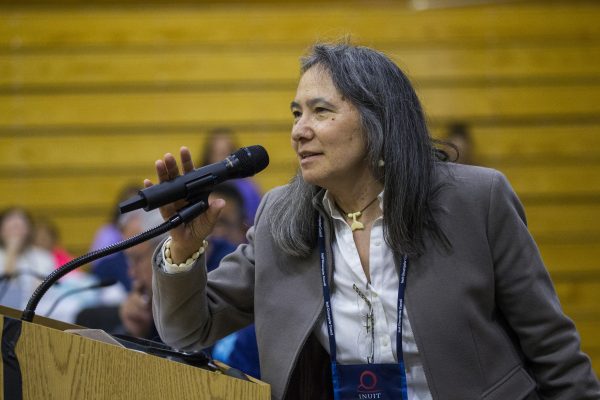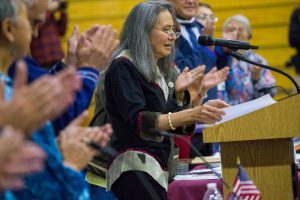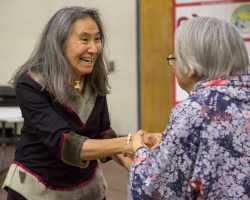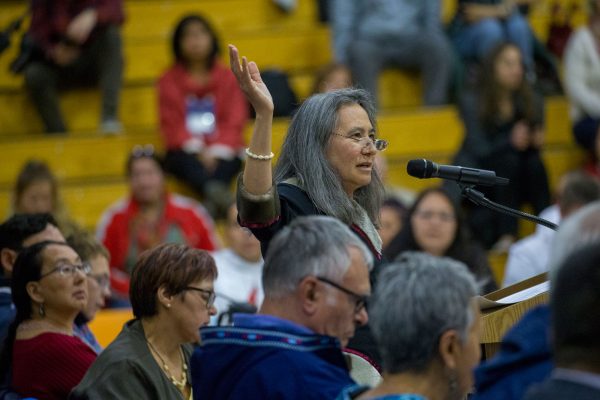UAA bids farewell to Dalee Sambo Dorough, recently elected chair of the Inuit Circumpolar Council
by Matt Jardin |

This past July, former UAA associate professor of political science Dalee Sambo Dorough, Ph.D., was unanimously voted to serve as international chair of the Inuit Circumpolar Council. The position carries a term limit of four years and represents the rights and interests of 165,000 Inuit in Alaska, Canada, Greenland and Russia. (Photo by Bill Hess)
Eighty thousand people - that's how many lives the average person impacts over the course of a lifetime, according to research from Funders and Founders.
For comparison, since her recent election to serve as international chair of the Inuit Circumpolar Council (ICC), former UAA associate professor of political science Dalee Sambo Dorough, Ph.D., now finds herself in a position that represents a population of 165,000 Inuit.
Speaking for a group that large can be enough to intimidate anybody, but Dorough's long history with both ICC and UAA makes her perfectly suited for the role.
"It's been quite an adjustment to go from being an independent academic to being sensitive to, responsive to, and cognizant of the priorities of your people at the international level. It's essentially what I've always been doing," she says. One look at her resume, and it's hard to disagree.
Dorough's work with ICC began long before her appointment as chair. In fact, her advocacy and relationship with the council is as long-running as the organization itself. Before even graduating high school, she was a volunteer with ICC just when it was being established in 1977, the same year the trans-Alaska oil pipeline was completed.
Founded by the late Eben Hopson of Utqiagvik (formerly Barrow) after anticipating the need to unite all Inuit in the face of increasing oil and other development on the North Slope, ICC represents the rights, interests and matters of the Inuit across Alaska, Canada, Greenland and Russia.
Today, the council has grown to be recognized and respected as an international nongovernmental organization with U.N. consultative status, and as one of six Indigenous Permanent Participants of the Arctic Council.

Before even graduating high school, Dorough was a volunteer with ICC just when it was being established in 1977, the same year the trans-Alaska oil pipeline was completed. (Photo by Bill Hess)
Representing ICC on the global stage is the international chair, a position that carries a term limit of four years and rotates between each member country. When the time comes to vote on a new chair, the governing body - consisting of one vice chair, two executive council members and 18 delegates from each member country - convenes at a general assembly held in the country next in line to provide a candidate.
This past July, the general assembly returned to ICC's birthplace of Utqiagvik. There, with nearly 1,000 attendees, Dorough was unanimously selected to serve as the organization's 13th international chair.
"I believe that one of the greatest honors bestowed upon an indigenous person is the simple expression of recognition, confidence and the support of your own people. I am genuinely honored to have been selected to lead the Inuit Circumpolar Council for the next four years," thanked Dorough during her acceptance speech.
Accompanying each new chair is an updated declaration outlining the council's objectives and strategy for the next four years. The declaration effectively serves as Dorough's roadmap and includes equal buy-in from each of the member countries. After all, as the axiom goes, "it takes a village."
This year's Utqiagvik Declaration consists of 10 sections with 58 clauses that highlight topics including health and well-being, language preservation and education strengthening, food security and food sovereignty, trade and economic development, and researching the impacts of climate change, just to name a few.
Dorough notes that while many of the issues covered in the latest declaration are the same as they were in ICC's first declaration, the approach has become more refined over time.
"Many of the initiatives we were concerned about in 1977 remain but have become more well-defined as we adapt to current conditions, including information technology and whatever innovative developments have taken place," she describes. "How can we utilize them and adapt them for our own purposes?"

Founded by the late Eben Hopson of Utqiagvik after anticipating the need to unite all Inuit in the face of increasing development on the North Slope, ICC has grown to be an international nongovernmental organization with U.N. consultative status, and as one of six Indigenous Permanent Participants of the Arctic Council. (Photo by Bill Hess)
In addition to the issues outlined in the declaration, Dorough is focusing her attention outward toward the subject of increased globalization. Specifically, how can Inuit maintain their way of life in the face of growing economic interest from powerful non-Arctic states?
The answer lies in Dorough's 10-year background as an educator for UAA. Instead of teaching students, however, she now teaches politicians and researchers.
"It's really a matter of education - informing states across the globe that the Inuit are distinct peoples and we have individual and collective rights that are unique from others. If they don't have a fundamental understanding of our cultural context, our worldviews and importantly our human rights, we remain vulnerable," explains Dorough.
She continues, "I'm of the view that everybody needs human rights education. If we want good governance, those responsible in government need to be informed about human rights - your human rights, my human rights, all human rights. In this way, respacing and recognizing human rights is not a part-time job, it's all of the time."
In order to accommodate her increased responsibilities with ICC, Dorough made the difficult decision to resign from her tenured position at the UAA Department of Political Science.
"I'll definitely miss that," she shares. "Being in the classroom, engaging students and creating opportunities for them, it can make all the difference in the world. I hope that at some point in time I can make my way back."
While there have been rumblings regarding a possible continued relationship between Dorough and the university during her four-year term as international chair, the former professor has plenty of work to keep her mind off of how much she misses teaching.
"It's my hope that in the next four years I can actually make a substantive difference in the lives of our people," says Dorough. "That's what the position is for, to speak for, defend and promote the rights, interests and concerns of our people. It's a relatively short period of time to do the most I can. One of the best things you can do as an indigenous person is make your people happy, so I hope I can make my people happy, even if it's in the smallest way."

Accompanying each new chair is an updated declaration outlining ICC's objectives and strategy for the next four years. This year's Utqiagvik Declaration highlights topics including health and well-being, language preservation and education strengthening, food security and food sovereignty, trade and economic development, and researching the impacts of climate change. (Photo by Bill Hess)
Written by Matt Jardin, UAA Office of University Advancement
 "UAA bids farewell to Dalee Sambo Dorough, recently elected chair of the Inuit Circumpolar
Council" is licensed under a Creative Commons Attribution-NonCommercial 4.0 International License.
"UAA bids farewell to Dalee Sambo Dorough, recently elected chair of the Inuit Circumpolar
Council" is licensed under a Creative Commons Attribution-NonCommercial 4.0 International License.









